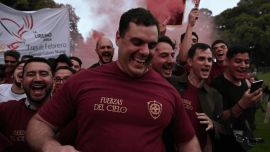For every peso declared to Mexican electoral authorities by political parties and candidates, 15 more are moving under the table, according to a report Tuesday on the problem of illegal campaign finance.
The non-profit Mexicans Against Corruption and Impunity published the report after months of investigation, concluding that Mexico's public campaign finance system has failed to keep illegal money from influencing elections.
The report says that the cash moving around electoral campaigns is such that Mexico's Central Bank has documented inexplicable increases in the amount of cash circulating in the economy in the five months before elections.
The money comes from both public and private sources. Money is siphoned from public programmes and local governments to fund campaigns and is funnelled to candidates by businesses interested in winning public contracts and having access to elected officials.
Buying benefits
"The illegal campaign financing is the principle problem of electoral democracy," said Maria Amparo Casar, one of the study's authors, in an interview prior to the report's release. "What it does is when one arrives to power, what you're doing is buying benefits."
On Monday, Mexico's electoral institute fined independent presidential candidate Jaime Rodríguez more than US$37,000 (739,000 pesos) for an assortment of alleged campaign violations, including having hundreds of state government employees working to gather the signatures necessary for him to appear on the ballot.
In response, Rodríguez tweeted that the regulatory agency targets only independent candidate because it is controlled by the major parties.
The National Electoral Institute announced the fines due to what it said was US$650,000 (12,800,329 pesos) of "irregular financing" for the candidate known as "El Bronco." It said it would also forward the case to the Attorney General's Office and Mexico's tax agency for further investigation.
The institute also accused Rodríguez of making banned contributions from businesses appear to come from individual supporters.
"It's a triangulation to make citizens appear as legitimate supporters, when in reality the money came from businesses with which these citizens have no relationship whatsoever," electoral institute council member Ciro Murayama said in a statement.
Rodríguez, on leave as governor of Nuevo Leon state, is one of four candidates in the July 1 presidential election. His campaign has largely framed itself as a threat to the status quo of the dominant political parties.
Policing spending
The campaign finance report released Tuesday said the electoral institute needs to do more such investigations and impose heavier fines. As it is, parties and candidates can make a cost-benefit analysis and decide that it is worthwhile to violate regulations if it could give them an edge in the election, Casar said.
Mexico's public campaign finance system, which has been in place for more than 20 years, has succeeded in levelling the playing field and making elections more competitive, the report said. But more aggressive policing of campaign spending is necessary.
It also concluded that the calculation used to set spending limits is not rooted in the reality of what it costs to run modern campaigns.
"The limits are like a promise of good behavior that no one follows and that stimulate even more violations of the law," the report said.
Asked if creating a legal and transparent path for private money to play a role in elections should be considered, Casar said public financing was still the best option. "The massive entry, like in the United States, of private money in a country like Mexico would deform the ideals of the foundations of fairness in elections in Mexico."
- AP


























Comments